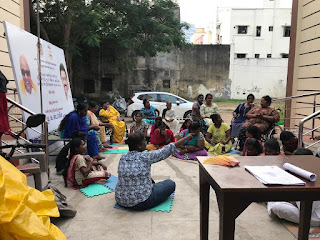Rapporteur: Sudaroli Ramasamy
It was Sunday evening when I reached the Better World Shelter for Women with Disabilities at Royapettah. The two things lingering in my mind before I started the conversation with the residents of the shelter home were:
1. The precautions that I need to take care of while I am bringing up the conversation for the Community Cafe. Because I do not want to trigger them at any point of time during the chit-chat.
2. The kind of language I should use in terms of consciously using the words with regard to disability in Tamil.
But once I reached there, they burst my bubbles of thoughts in the air with their bright smiles and giggling with laughter; they made me so comfortable. We sat in a big circle, it was a casual conversation. I started the same with asking them to introduce themselves with their name and one thing they are fond of. They were very enthusiastic and eager to share what they liked - it ranged from their love for malligai poo (jasmine flower) to eating ice cream. After the introduction, they started taking the conversation forward from the status of women in the society to the discrimination they face in public spaces, workspaces, etc. The conversation was around their own experiences in the purview of disabilities and the challenges they face. They were talking about how the people are not empathetic towards them; how it was very challenging when they travel in the bus; how the people do not want to see them when they start a day/ go for an auspicious activity; the layers of religion and gender added to the disability and posed itself as several layers of burden.
They were sharing about the people's attitude to them based on their religion when they were approached for matchmaking for marriage. I was quite enraged when I heard them say - though the bridegroom had a disability, his family would look for the non-SC girl and it did not matter if the girl had a disability or not. The residents were talking about how people took advantage of them under the guise of helping the residents. One visually-impaired girl was describing how a man who helped her earlier, stalked her to the shelter. Sexual abuse and exploitation are not the exclusion here. Each of their experiences speaks about their solidarity in supporting each other in all instances.
Dr. Aishwarya Rao, the founder of the organization, was part of the conversation. It was heartwarming to see the friendly relationship between the residents and the founder. They were very casually talking in her presence without any hesitation. She flagged how vulnerable they are in all spaces - public and private. She was very proud of the strong bond of solidarity expressed by the residents.
It was a great experience to learn from them, to know the importance of solidarity, finding the little joys in life and fighting against all odds with a smile.


.jpeg)

No comments:
Post a Comment